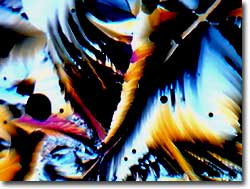Chemical Crystal Movie Gallery
Ammonium Persulfate Time Lapse Sequences
Ammonium persulfate crystals are used as an alternative to traditional ferric chloride solutions for copper etching. The white crystals are soluble in water and decomposed by heat.

Having a molecular weight of 228.20 and a chemical composition of two ammonium molecules plus two sulfur and eight oxygen atoms, ammonium persulfate is classified as a dangerous chemical because it is a very strong oxidizer. Crystals of ammonium persulfate, known alternatively to inorganic chemists as ammonium peroxydisulfate or peroxydisulfuric acid, are odorless, white, and have a melting point of 120 degrees Celsius. In the presence of moisture, the compound disintegrates to form oxygen and ozone, and if incinerated, may produce nitrogen oxides, sulfur oxides, and sulfuric acid. Ammonium persulfate is incompatible with water, organic material, reducing agents, and powdered metals, especially aluminum. Therefore, special storage, such as the use of plastic-lined barrels, is required to avoid these risks. Classified as a toxic substance, ingestion of ammonium persulfate is harmful, it rapidly destroys mucous membranes, and if contacted by skin, may cause dermatitis and chemical sensitivity.
Other roles for this compound, also known as diammonium salt or diammonium peroxydisulfate, are as an oxidizing and bleaching agent, a reagent in electroplating, and an oxidant in manganese, iron, and steel analyses. The chemical industry uses ammonium persulfate to commercially produce other persulfate compounds and aniline dyes, while the organic synthetics industry uses the compound for initiating various polymerization processes. In oil and gas exploration, peroxydisulfuric acid is injected as an additive for mine fracturing. Ammonium persulfate plays a role in commercial food preservation, the decolorization, bleaching, and deodorization of cooking oils, and is used as a wheat ripener. In medicine, ammonium persulfate is applied in an analytical laboratory method for detecting urinary iodine. This inorganic reagent digests urine, with iodide as the catalyst for the reduction, changing from a yellow-colored to a colorless solution. In this colorimetric method, the rate of color change is taken as a measure of iodine concentration.
Ammonium Persulfate Time Lapse Sequence #1 - Dendritic and some spherulitic crystals form as crystallization occurs from several directions in this time-lapse sequence of 27 images.
Ammonium Persulfate Time Lapse Sequence #2 - A time-lapse sequence of 14 images illustrates crystal formation originating in several locations in the viewfield.
Ammonium Persulfate Time Lapse Sequence #3 - A 16-image time-lapse sequence illustrates crystallization advancing from several nucleation sites.
Ammonium Persulfate Time Lapse Sequence #4 - Crystallization advances from several areas within the viewfield to form a nearly-confluent texture in a time-lapse sequence of 23 images.
Ammonium Persulfate Time Lapse Sequence #5 - Crystal growth occurs from a large number of widely dispersed sites across the viewfield in this sequence of 16 images.
Contributing Authors
Omar Alvarado, Thomas J. Fellers and Michael W. Davidson - National High Magnetic Field Laboratory, 1800 East Paul Dirac Dr., The Florida State University, Tallahassee, Florida, 32310.
BACK TO THE CHEMICAL CRYSTAL MOVIE GALLERY
BACK TO THE DIGITAL IMAGE GALLERIES
Questions or comments? Send us an email.
© 1995-2025 by Michael W. Davidson and The Florida State University. All Rights Reserved. No images, graphics, software, scripts, or applets may be reproduced or used in any manner without permission from the copyright holders. Use of this website means you agree to all of the Legal Terms and Conditions set forth by the owners.
This website is maintained by our
Graphics & Web Programming Team
in collaboration with Optical Microscopy at the
National High Magnetic Field Laboratory.
Last Modification Friday, Nov 13, 2015 at 01:19 PM
Access Count Since September 17, 2002: 20443
Visit the website of our partner in introductory microscopy education:
|
|
